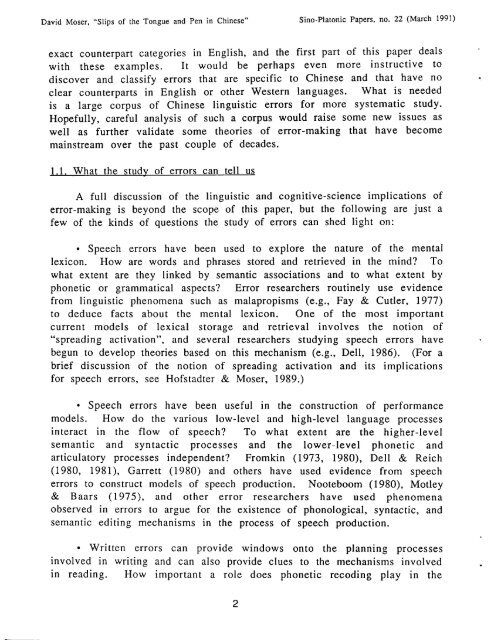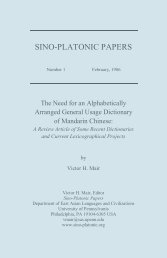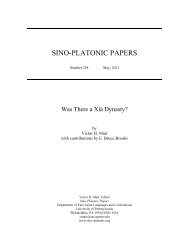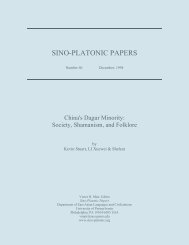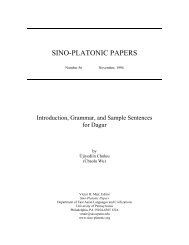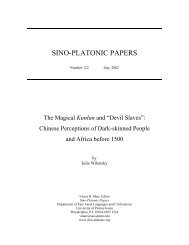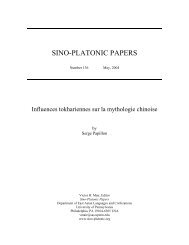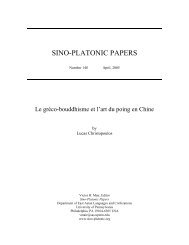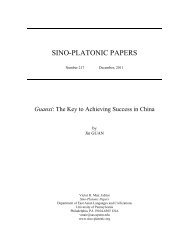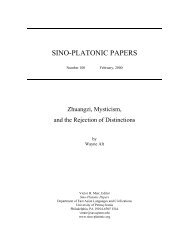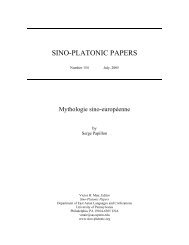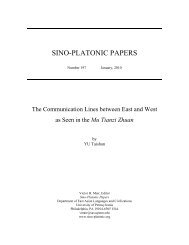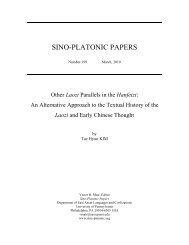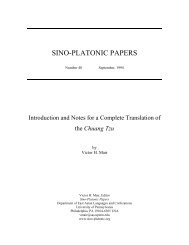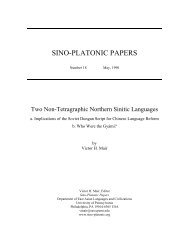Slips of the Tongue and Pen in Chinese - Sino-Platonic Papers
Slips of the Tongue and Pen in Chinese - Sino-Platonic Papers
Slips of the Tongue and Pen in Chinese - Sino-Platonic Papers
Create successful ePaper yourself
Turn your PDF publications into a flip-book with our unique Google optimized e-Paper software.
David Moser, "<strong>Slips</strong> <strong>of</strong> <strong>the</strong> <strong>Tongue</strong> <strong>and</strong> <strong>Pen</strong> <strong>in</strong> Ch<strong>in</strong>ese"<br />
S<strong>in</strong>o-<strong>Platonic</strong> <strong>Papers</strong>, no. 22 (March 199 1)<br />
exact counterpart categories <strong>in</strong> English, <strong>and</strong> <strong>the</strong> first part <strong>of</strong> this paper deals<br />
with <strong>the</strong>se examples. It would be perhaps even more <strong>in</strong>structive to<br />
discover <strong>and</strong> classify errors that are specific to Ch<strong>in</strong>ese <strong>and</strong> that have no<br />
clear counterparts <strong>in</strong> English or o<strong>the</strong>r Western languages. What is needed<br />
is a large corpus <strong>of</strong> Ch<strong>in</strong>ese l<strong>in</strong>guistic errors for more systematic study.<br />
Hopefully, careful analysis <strong>of</strong> such a corpus would raise some new issues as<br />
well as fur<strong>the</strong>r validate some <strong>the</strong>ories <strong>of</strong> error-mak<strong>in</strong>g that have become<br />
ma<strong>in</strong>stream over <strong>the</strong> past couple <strong>of</strong> decades.<br />
1.1. What <strong>the</strong> studv <strong>of</strong> errors can tell us<br />
A full discussion <strong>of</strong> <strong>the</strong> l<strong>in</strong>guistic <strong>and</strong> cognitive-science implications <strong>of</strong><br />
error-mak<strong>in</strong>g is beyond <strong>the</strong> scope <strong>of</strong> this paper, but <strong>the</strong> follow<strong>in</strong>g are just a<br />
few <strong>of</strong> <strong>the</strong> k<strong>in</strong>ds <strong>of</strong> questions <strong>the</strong> study <strong>of</strong> errors can shed light on:<br />
Speech errors have been used to explore <strong>the</strong> nature <strong>of</strong> <strong>the</strong> mental<br />
lexicon. How are words <strong>and</strong> phrases stored <strong>and</strong> retrieved <strong>in</strong> <strong>the</strong> m<strong>in</strong>d? To<br />
what extent are <strong>the</strong>y l<strong>in</strong>ked by semantic associations <strong>and</strong> to what extent by<br />
phonetic or grammatical aspects? Error researchers rout<strong>in</strong>ely use evidence<br />
from l<strong>in</strong>guistic phenomena such as malapropisms (e.g., Fay & Cutler, 1977)<br />
to deduce facts about <strong>the</strong> mental lexicon. One <strong>of</strong> <strong>the</strong> most important<br />
current models <strong>of</strong> lexical storage <strong>and</strong> retrieval <strong>in</strong>volves <strong>the</strong> notion <strong>of</strong><br />
"spread<strong>in</strong>g activation", <strong>and</strong> several researchers study<strong>in</strong>g speech errors have<br />
begun to develop <strong>the</strong>ories based on this mechanism (e.g., Dell, 1986). (For a<br />
brief discussion <strong>of</strong> <strong>the</strong> notion <strong>of</strong> spread<strong>in</strong>g activation <strong>and</strong> its implications<br />
for speech errors, see H<strong>of</strong>stadter & Moser, 1989.)<br />
Speech errors have been useful <strong>in</strong> <strong>the</strong> construction <strong>of</strong> performance<br />
models. How do <strong>the</strong> various low-level <strong>and</strong> high-level language processes<br />
<strong>in</strong>teract <strong>in</strong> <strong>the</strong> flow <strong>of</strong> speech? To what extent are <strong>the</strong> higher-level<br />
semantic <strong>and</strong> syntactic processes <strong>and</strong> <strong>the</strong> lower-level phonetic <strong>and</strong><br />
articulatory processes <strong>in</strong>dependent? Fromk<strong>in</strong> (1973, 1980), Dell & Reich<br />
(1980, 1981), Garrett (1980) <strong>and</strong> o<strong>the</strong>rs have used evidence from speech<br />
errors to construct models <strong>of</strong> speech production. Nooteboom (1 980), Motley<br />
& Baars (1975), <strong>and</strong> o<strong>the</strong>r error researchers have used phenomena<br />
observed <strong>in</strong> errors to argue for <strong>the</strong> existence <strong>of</strong> phonological, syntactic, <strong>and</strong><br />
semantic edit<strong>in</strong>g mechanisms <strong>in</strong> <strong>the</strong> process <strong>of</strong> speech production.<br />
Written errors can provide w<strong>in</strong>dows onto <strong>the</strong> plann<strong>in</strong>g processes<br />
<strong>in</strong>volved <strong>in</strong> writ<strong>in</strong>g <strong>and</strong> can also provide clues to <strong>the</strong> mechanisms <strong>in</strong>volved<br />
<strong>in</strong> read<strong>in</strong>g. How important a role does phonetic recod<strong>in</strong>g play <strong>in</strong> <strong>the</strong>


